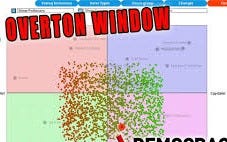Knowing what an acceptable argument is might seem like a curious question. It's been a popular topic within a number of political science faculties for some time. Not simply what acceptable viewpoints are but how arguments within political structures shift. That is, if I'm trying to make an argument that might not be acknowledged at the moment, how do I shift the conversation such that it becomes acceptable later.
You could look at the civil rights era during the 1960s as a good example of shifting certain political orientations as no longer being viable within general discourse. How you do this from a practical point during a debate is at the center of this line of thinking.
From a more practical purpose it was claimed during the early 1990s the political discourse existed within set parameters. Most people might not be conscious of it but we try to tailor our comments to what society has deemed reasonable. Political parties spend a lot of time trying to establish what is going to be discussed during any particular election cycle. This is akin to saying what is acceptable and not within the forms of debate.
This is what the term the Overton window came to mean. And more to the point it's practical application was that most political arguments were trying to move it in a certain direction. The point being to try and make oppositional points increasingly difficult. One could try and ostracize a different view such that it was no longer considered reasonable. Joseph Overton, who it was named after, was one who argued that there was a constant move towards more socialist positions within developed countries. That is by nature more left-wing positions would always become more and more acceptable.
Of course one of the biggest problems with that is that anybody who came up with a brainstorming idea had to run it through the intellectual gatekeepers before it was considered proper to speak publicly. In short the idea ended up being a means for those in authority to say what was and what was not acceptable.
Traditional views on liberal speech rights always worked against this idea. If you wanted to bring a few points to the forefront it was perfectly within your rights to do so even if everyone thought you were crazy. It was for you to try and convince others that your point was valid and if you could do so everything was proper. If someone really brought something that was outside of a reasonable convert station then their view would be shown to be ridiculous on its face.
In short, traditional speech rights always argued that anybody who is outside of the norm would be shown to be so well exercising their right at the same time.
The entire practice of arguing that there was a normalized middle where acceptable viewpoints existed always meant that there was much more control over speech through subtle means. You didn't have to outlaw what somebody was saying; you could simply say that the viewpoint was outside society's limits.
Whether Overton himself intended it would get to this is an open debate. Most social democrats used to focus primarily on economic points. Increasing government spending had been seen as inevitable during the 1970s. The reaction that those that would see cuts as being reasonable was to try and make it increasingly uncomfortable to try and argue for that point.
Has conversation started to shift more to cultural points it produced a different end. Arguing that things like biological science we're no longer accepted because they were outside of reasonable conversation was a completely different approach.
Something that it did open was there was a number of those within the political climate that were always looking to ostracize certain political positions. The Overton window provided an easy answer on different perspectives other than economics that became attractive.
For those that were trying to create a political spectrum that contained any conversations they didn't like this was an ideal way to approach. It was especially true because the implication was you could constantly shift the political spectrum in One direction, typically towards the left for those that were trying to imply, without really having to win too many arguments. Or at the very least you could be assured that the opposition arguments would sooner or later become too extreme in what most people viewed.
If you look at terminology used in Europe at the moment when more or less any political party that doesn't support what European Union officials say instantly gets categorized as being alt right or a Neo-Nazi group this is where you would find the answer. Their belief that they have shifted normalized speech to include only things that they expect to hear has allowed them to cloud out anybody different.
Anything that dealt with something that you could deem a right was another perspective. Rather than questioning whether or not somebody had the right to a job. Or more recently those that would argue that housing is a human right and the government has an obligation to provide for everyone you change the mode of conversation. Rather than somebody being able to question whether or not something is all right simply invoking the term shifted the Overton window in such a fashion you weren't allowed to question.
One of the biggest questions that's emerged is how somebody who is openly outside of the considered Overton window reacts. If trying to survey the current political climate in a number of countries is the best opposition has been to open new political groups. As increasing numbers of institutions have been captured by those who believe the Overton window is a real thing trying to operate outside of it has meant finding non-official means to come back at it. Within Europe it's been relatively easy to set up new political parties. There's also been the suggestion of setting up new modes of higher learning to get outside of a formal University.
All of these keep coming back to the same point: if you try to limit what is allowed to be discussed, those that object will find some means to make their voices heard. The best means of trying to deal with opposition remains to engage it and have a serious conversation as to why you disagree with another idea. Trying to force it out of the public square will only make it go underground.
The basic notion of an acceptable window as Overton tried to suggest always carried with it the idea that those in authority could determine appropriate speech. It always had a component of censorship by a different means without having to worry about legal complexities. That current political feedback seems to suggest that it's losing its potency and we're seeing increasing pushback with those outside of official channels forcing their positions to be heard might suggest that it was always a long shot in the first place.



